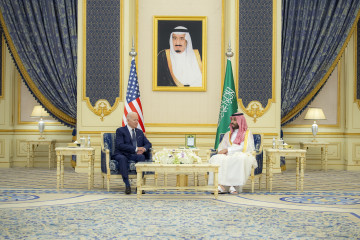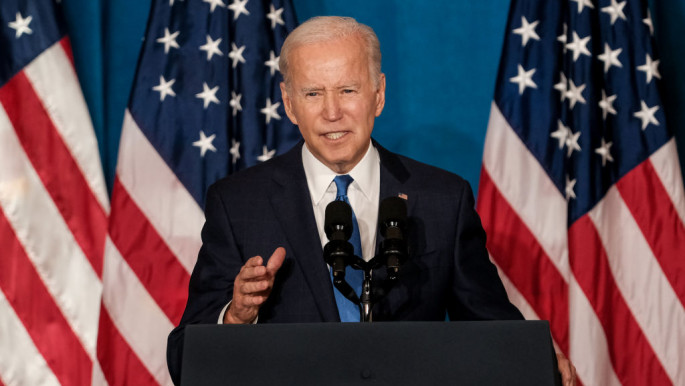

Saudi Arabia’s energy partnership with Russia, which leads OPEC+ together with Riyadh, is important to the health of the Kingdom’s economy.
But Riyadh and Moscow’s relationship in this domain is about much more than economics. It’s also about Saudi Arabia’s geopolitical independence.
Energy cooperation with Moscow factors into Crown Prince and Prime Minister Mohammed bin Salman (MbS)’s message to Washington that the Saudis will pursue their own interests on the international stage without taking orders from the West.
"After OPEC+ announced steep production cuts in early October 2022, tensions between Washington and Riyadh soared"
But not all in Washington take well to the realities of a more multipolar world in which US hegemony is much weaker than it was two or three decades ago.
After OPEC+ announced steep production cuts in early October 2022, tensions between Washington and Riyadh soared.
Many US officials angrily accused the Kingdom of supporting Vladimir Putin in the Ukraine war while spiting President Joe Biden and his Democratic allies in the US one month before the 2022 midterm election. Biden declared that the Kingdom would face “consequences” for the cartel’s decision to reduce production.
Yet, nearly four months later the US administration has not taken any action against Saudi Arabia in response to the production cuts.
The White House’s refrain from any punitive measures against the Saudis in connection to OPEC+ is due to “both a lack of effective alternatives and fear of further market destabilisation,” Caroline Rose, a Senior Analyst and Head of the Power Vacuums program in the Human Security Unit at the New Lines Institute, told The New Arab.
“The US has acted methodically and has sought to gauge OPEC’s long-term reaction to the exchange of warnings we saw earlier last fall.”
In the Saudi analyst Ali Shihabi’s view, “the US realised it over-reacted, particularly after oil markets proved that the Saudi and OPEC+ decision was driven by market fundamentals”.
|
|
Gas prices and Iran
The decision by OPEC+ to reduce output did not result in oil prices soaring as many analysts warned at the time.
The Covid-19 situation in China partly explains why. Also, with America’s 2022 midterm election having been completed almost three months ago, team Biden’s political imperatives to take any action against Riyadh for the OPEC+ decision have passed.
“At this point, imposing consequences on Saudi Arabia would harm a key strategic relationship without giving the White House any immediate political gain,” said Ryan Bohl, a Middle East and North African analyst at the risk intelligence company RANE, in a TNA interview.
“On the practical level, the OPEC+ decision failed to raise oil prices for reasons beyond the control of Riyadh, Moscow, or Washington. The American fracking industry shook off its laid-back approach and increased production. At the same time, Russia could afford to call Europe’s bluff by taking oil off the market. Moscow has, instead, accelerated exports of deeply discounted oil to big consumers such as China and India, keeping up supply and depressing prices,” Patrick Theros, the former US ambassador to Qatar, told TNA.
"At this point, imposing consequences on Saudi Arabia would harm a key strategic relationship without giving the White House any immediate political gain"
“China’s shambolic response to the spread of new COVID virus mutations has delayed its economic recovery and, consequently, dampened its demand for oil. Finally, the OPEC+ decision to reduce the headline rate of oil production by one million barrels a day failed to account for the reality that total OPEC+ production has stayed well below the headline rate; too many OPEC countries have failed to reach their quota maximums. Consequently, oil prices have fallen, MbS’ ploy failed, and Biden won without lifting a finger,” added Theros.
Then there is the issue of Iran. Given concerns about how the new Israeli government may approach Tehran against the backdrop of Joint Comprehensive Plan of Action (JCPOA) negotiations collapsing in acrimony and heightened concerns about instability in Iran prompting the Islamic Republic to lash out regionally, the Biden administration will face difficult dilemmas vis-à-vis Tehran in 2023.
Within this context, the White House does not believe that this is a time for a worsening crisis in Washington-Riyadh relations mindful of the Kingdom’s importance to US strategies for weakening Iran.
“The United States and Saudi Arabia share similar perspectives about the security threat Iran poses, so punishing Saudi Arabia now - when the behaviour of the Iranian regime is even less predictable in light of the continuing widespread protests there - would be akin to cutting off one’s nose to spite one’s face,” Gordon Gray, the former US ambassador to Tunisia, told TNA.
|
|
Seeking an easier relationship with MbS
It is safe to assume that much contention will continue shaping Washington’s relations with OPEC and OPEC+ throughout 2023. This is especially so as the war in Ukraine rages on while the US leadership seeks lower energy costs and offsets.
Yet, this is not a time in which Biden wants a major feud with MbS or an exacerbation of tensions between Washington and Riyadh. As Theros explained, “geopolitically, Biden's plate is overflowing”.
From trying to maintain NATO’s relative unity against Moscow to dealing with Israel’s newly empowered government and addressing critical trade issues in Europe and the Pacific to dealing with a Republican-controlled House of Representatives that guarantees gridlock and debt limit threats, there is a “toxic confluence of world-shaking threats to international stability that would test the capacity of any administration to deal with them,” said Theros.
"At this particular juncture in history, the US needs OPEC more than the other way around. That may not last, but it's the conditions of the day"
“MbS’ attempt to harm Biden politically, if that is indeed what he had in mind, has fizzled, so why waste overstrained attention and resources on an unnecessary fight? It can wait for calmer days.”
When asked about the Biden administration’s policies toward the cartel, Shihabi told TNA that he thinks Washington has “calmed down” and the expert on Saudi Arabia does “not foresee another attempt to influence OPEC in such a public way again”.
The US lacks a backup to OPEC/OPEC+ oil. Therefore, the idea of Washington attempting to punish the cartel or pressure it into increasing production is “unlikely to happen,” explained Bohl.
“At this particular juncture in history, the US needs OPEC more than the other way around. That may not last, but it's the conditions of the day.”
Giorgio Cafiero is the CEO of Gulf State Analytics.
Follow him on Twitter: @GiorgioCafiero






 Follow the Middle East's top stories in English at The New Arab on Google News
Follow the Middle East's top stories in English at The New Arab on Google News


